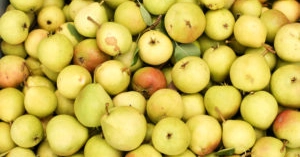I pulled up to the house a bit early. I wanted to get my bearings and enjoy the fall air before the bustle of picking started. The air was cool and there was a bit of wind against my jacket, but it was a beautiful day to spend collecting fruit. In Edmonton, autumn is very short. The previous day, the sun was out and the leaves, though yellow, were still clinging to the trees as though it were summer. It was the third week of September, late in the picking season, but fruit still hung on the trees. I met Nancy MacLean and Jo-anne Menard in front of the house. They pulled up in a small orange car, talking animatedly and waving at me. I stepped into the vehicle and we were on our way to the trees.
Traditionally, autumn is a season of harvest — the celebration of a year of bounty and sustainability, and of thanks for the good things that happened during the year. Tables are filled with delicious, healthy, whole foods grown throughout the year. It is often a time of plenty, and of preparation for the coming winter. However, with the advent of the modern supermarket, the season’s meaning has been reduced to a time of pretty leaves and the start of school. We can have food from anywhere in the world, whenever we want it. The surplus of imported and synthetic foods has divorced us from the pastoral system of seasonal change. Now that we can eat peaches no matter the season, fruits and vegetables no longer have the same meaning. Many people still grow fruit in the Edmonton area, but a lot of that food goes to waste. Most of it either ends up in the garbage or rotting in people’s backyards.
“People who grow fruit usually get way more than they need,” says MacLean. Every year, there are hundreds of trees whose fruits end up falling to the ground and rotting. while there are still people in the city who go hungry.
That’s where Fruits of Sherbrooke comes in. The organization was founded in 2010, when three Edmonton citizens decided to do something about the amount of food going to waste in the city.
Volunteers go on picking expeditions and use these fruits to make jams and preserves.
Local market vendors also offer Fruits of Sherbrooke their excess and unsold fruit, as well as so-called “ugly fruits” that don’t get sold. They are even beginning an organic line of jams with fruits donated from the local Organic Box group.
Fruits of Sherbrooke also has a large number of other products and projects on the go, including Project: Fruit Stars, a successful Kickstarter campaign that will provide fresh fruit to those who need it most in Edmonton.
Edmonton’s hunger problem is significant. According to a Global News article published in July, 3,000 more people accessed the Edmonton Food Bank that month than in previous September. The Student Food Bank at MacEwan University reported a 47 per cent increase in access over the past year. Fruits of Sherbrooke is trying to mitigate this hunger with the food that already grows in Edmonton.
The backyard we visited had three fruit trees in it. One of them was full of rotten apples from the previous year, an example of what would happen without organizations like Fruits of Sherbrooke. Two pear trees, though, were full of ripe and delicious fruit. As I bit into a tree-ripened pear, I was shocked by the juice. This was the juiciest pear that I had eaten in a long time, but the taste was different from a store-bought pear. It was sour and slightly bitter, but it was delicious.
“We have to change our perspective about how fruit is supposed to taste: how a pear should taste, how a cherry should taste, or apples,” says MacLean.
“We should be eating locally and just respecting and appreciating the fact that fruit that we grow here tastes very good and is very healthy.”
The results of our pick were impressive: in just 30 minutes, we filled four bins with ripe, tangy pears — all from two trees in one yard.
While Fruits of Sherbrooke is on the spectrum of organic-meets-sustainable food, most of what they do isn’t actually certified organic. The very fact that they get their food from so many sources makes it nearly impossible to gain and maintain an organic certification, notes MacLean. Instead of being organic for the sake of being organic, Fruits of Sherbrooke has decided to promote a more local and sustainable kind of agriculture. To be an organic food producer, one must follow guidelines that pertain to the kinds of products used to grow food. Essentially, there can be no synthetics of any kind in the organic food production process. Introduction of synthetics — be it feed, fertilizer, antibiotics, pesticides, or anything else — generally excludes food from being organic. Organic food can also be grown on an industrial scale, with industrial-sized waste and environmental impact, as Michael Pollan describes in his book, The Omnivore’s Dilemma.
“I would much rather eat fruit that is grown in Edmonton than fruit that is trucked in,” says MacLean. The amount of fruit that is grown in Edmonton is enormous, and many surprising varieties are grown in our communities, such as kiwis and pears.
Fruits of Sherbrooke doesn’t need to transport apples and other fruits from across the continent; rather, the organization uses excess food from our own city to feed people. Focusing on this localized process makes for a more community-driven and sustainable food system. This method also creates a sense of pride in the area, making people come together with a traditional agricultural outlook on what it means to feed each other.
All of the fruit we picked was going to be turned into juice later that day. Fruits of Sherbrooke is set up in Westmount Community Hall, where they use a juicing station in the kitchen. When I walked into the hall, I was shocked by the amount of fruit gathered in one day by pickers and donors. The colours in the kitchen caught my eye. There were jars of deep purple juice made from produce donated by Organic Box, and they contrasted beautifully against the yellow of freshly squeezed apple juice. The colours of fresh fruit stood out and seemed rather real compared to those found on supermarket shelves.
When I left Fruits of Sherbrooke, I was given a grocery bag full of fresh, sustainably grown fruit that was far more meaningful than the standard supermarket fruit. It was a good feeling. We had a sense of the rural responsibility to one’s neighbour that has, until recently, been lacking in urban settings. Urban food sustainability is a hot button issue in the world today. With urbanization and commodification of food, we have lost a sense of season, the land and the way that food comes to us. By getting back to this sense of responsibility to the land, we open our eyes to the way we feed ourselves and how we can change that for the better.
Photos by Madison Kerr





0 Comments